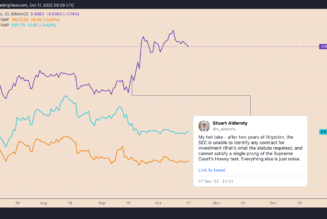
Officials from the Reserve Bank of India (RBI) have reportedly sounded the alarm bells again over crypto adoption, which they claim will ultimately lead to the “dollarization” of the local economy.
According to a Monday report from the Indian branch of the Economic Times — which cited unnamed sources — the RBI’s concerns are focused on U.S. dollar-dominated cryptocurrencies taking away market share from the Indian rupee.
The publication notes that RBI officials, along with its governor Shaktikanta Das, provided a briefing to the Parliamentary Standing Committee on Finance this week. In it, they took a very skeptical stance toward crypto’s potential influence on the financial system. An unnamed official is quoted as saying:
“Almost all cryptocurrencies are dollar-denominated and issued by foreign private entities, it may eventually lead to dollarization of a part of our economy which will be against the country’s sovereign interest.”
“It [crypto] will seriously undermine the RBI’s capacity to determine monetary policy and regulate the monetary system of the country,” they added.
The RBI was said to have been particularly irked by the notion of crypto being used in cross-border transfers instead of the rupee, while the common anti-crypto tropes of terror financing, money laundering and drug trafficking were also highlighted again.
This is the second time this month that the RBI has expressed anti-crypto action, with Coinbase CEO Brian Armstrong suggesting last week that the exchange’s abrupt stoppage of its United Payments Interface (UPI) in India was due to pressure from the RBI.
“So a few days after launching, we ended up disabling UPI because of some informal pressure from the Reserve Bank of India (RBI), which is kind of the Treasury equivalent there,” he said, adding that they basically applying “soft pressure behind the scenes to try to disable some of these payments which might be going through UPI.”
Related: Indian minister wants global crypto rules to curtail money laundering risk
It appears that the Indian government is also not looking favorably on digital assets of late, and has instead taken a relatively stifling approach to crypto since outlining intentions to regulate the sector in December.
On April 1, the government implemented a 30% crypto tax on digital asset holdings and transfers, along with several other stringent taxation guidelines that were based on gambling and lottery ticket win tax rules. In the following ten or so days after the laws went into effect, trading volume on top Indian crypto exchanges declined as much as 70%.
 [flexi-common-toolbar] [flexi-form class=”flexi_form_style” title=”Submit to Flexi” name=”my_form” ajax=”true”][flexi-form-tag type=”post_title” class=”fl-input” title=”Title” value=”” required=”true”][flexi-form-tag type=”category” title=”Select category”][flexi-form-tag type=”tag” title=”Insert tag”][flexi-form-tag type=”article” class=”fl-textarea” title=”Description” ][flexi-form-tag type=”file” title=”Select file” required=”true”][flexi-form-tag type=”submit” name=”submit” value=”Submit Now”] [/flexi-form]
[flexi-common-toolbar] [flexi-form class=”flexi_form_style” title=”Submit to Flexi” name=”my_form” ajax=”true”][flexi-form-tag type=”post_title” class=”fl-input” title=”Title” value=”” required=”true”][flexi-form-tag type=”category” title=”Select category”][flexi-form-tag type=”tag” title=”Insert tag”][flexi-form-tag type=”article” class=”fl-textarea” title=”Description” ][flexi-form-tag type=”file” title=”Select file” required=”true”][flexi-form-tag type=”submit” name=”submit” value=”Submit Now”] [/flexi-form]










Tagged: crypto blog, Crypto news, Crypto tax, Indian crypto regulation, RBI, Reserve Bank of India